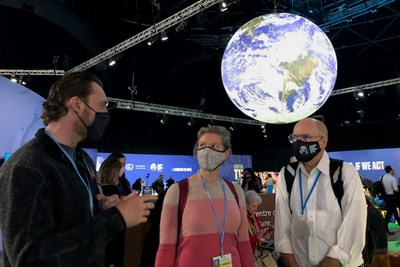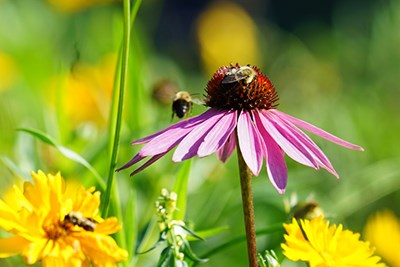Students, Faculty Represent UML at United Nations Climate Summit in Egypt
 Image by Raj Kumar Gondle
Image by Raj Kumar Gondle
12/06/2022
By Brooke Coupal
As a 20-year-old college student, Madison Feudo questioned whether she could impact climate change. But a trip to COP27 left her feeling empowered.
“I’m going to go back to Lowell, and I’m going to do what I can to make a difference,” the junior peace and conflict studies major said while in Sharm El Sheikh, Egypt, in early November for the annual United Nations climate summit.
UMass Lowell sent three students and three faculty members to this year’s COP, or Conference of the Parties, where they were the only delegation from a public university in Massachusetts. The students’ trip was funded by the Rist Institute for Sustainability and Energy.
“The students and faculty had the wonderful opportunity to be official observers at COP27,” Chancellor Julie Chen says. “They gained a further understanding of what we need to do as citizens, as universities and as nations to move in the right direction.”
Nearly 200 countries participated in COP27, sharing their climate action strategies and goals while negotiating the next steps toward mitigating climate change.
UMass Lowell was granted full observer status for this COP and future summits after attending COP26 in Glasgow, Scotland, in November 2021 under provisional observer status.
Feudo attended the first week of COP27 along with Riva Chatsman, a junior accounting major, and Raj Kumar Gondle, civil and environmental engineering assistant teaching professor.
 Image by Arie Perliger
Image by Arie Perliger
Atmospheric sciences Ph.D. student Tyler Harrington traveled to Egypt for the second and final week of the summit with Criminology and Justice Studies Prof. Arie Perliger and Environmental, Earth and Atmospheric Sciences Prof. Juliette Rooney-Varga, who is the director of the Climate Change Initiative and a co-director of the Rist Institute.
“COP is really one of the most exciting, cross-disciplinary conferences that I think exists,” says Rooney-Varga, who previously went to COP26 in Glasgow and COP21 in Paris.
‘1,000 Conferences in One’
With dozens of events happening each day, Rooney-Varga told the students beforehand that “COP is like 1,000 conferences in one.”
Chatsman, who has a minor in climate change and sustainability, didn’t understand the full scope of what Rooney-Varga meant until she arrived at the summit.
“It was overwhelming at first. There’s just so much to learn,” she says. “There are people from every corner of the world to provide a different perspective on their experience with climate change.”
One perspective that stood out to Gondle came from members of the Ukraine delegation, who spoke about how the war in their country has negatively impacted the environment.
 Image by Raj Kumar Gondle
Image by Raj Kumar Gondle
Perliger got a glimpse of how climate change influences societal challenges in other countries. He had a particular interest in how legal systems are adapting to address climate change.
“It was really interesting to see how different countries are focusing on different facets of climate,” he says.
The UML delegation had the opportunity to hear from leaders of the United States, including Special Presidential Envoy for Climate John Kerry and President Joe Biden, who spoke about the Inflation Reduction Act that he signed into law in August. Biden called the legislative package “the biggest, most important climate bill in the history of our country.”
“It was really nice to hear the president speak about the timeline of that bill and what change it’s going to make,” Feudo says.
Loss and Damage
Harrington spent much of his time at COP27 listening to negotiations between the nearly 200 countries that make up the United Nations as they worked toward a final agreement that spelled out their next steps in combating climate change.
“Developing nations argued that they haven’t contributed that much to greenhouse gas emissions, but they’re feeling the effects from it, and so they think developed countries should provide financial compensation to help mitigate those damages,” he says.
By the end of the two weeks, the countries reached the decision to create a loss and damage fund.
The final agreement doubled down on the goal to limit global warming to 1.5 degrees Celsius above pre-industrial levels, as laid out in the Paris Agreement; however, it did not spell out how this goal will be achieved. The Earth has already warmed by about 1.1 degrees Celsius.
“The focus of this COP was much more on loss and damage and recovering from past and current climate impacts as opposed to bringing the world together to cut emissions,” Rooney-Varga says. “I understand why loss and damage is a critical component of the negotiations, but I feel like if we don’t focus on cutting emissions, there is no amount of money that will cover the loss and damage that we’re all going to suffer.”
 Image by Arie Perliger
Image by Arie Perliger
Rooney-Varga presented three times while at COP. She spoke about leveraging the power of education as a motivator for climate action and presented on the climate simulator En-ROADS.
For Rooney-Varga, a major highlight of COP27 was seeing the students immersed in the climate summit.
“They were just wide-eyed and soaking it all in,” she says. “That was a gift for me to see.”
The trip encouraged the students to do more when it comes to mitigating climate change. Feudo now looks to shop at companies with sustainable practices and is working to improve her own climate literacy and the climate awareness of others. Chatsman, the president of the Student Society for Sustainability, plans to continue collaborating with the Rist Institute to host sustainability events. Harrington, who already takes personal actions to tackle climate change like limiting how much he drives and not eating meat, is looking to get involved in community climate action.
“It’s super-valuable for students to attend COP, meet new people, see all the different perspectives and hopefully be inspired to make changes at home,” Harrington says.




